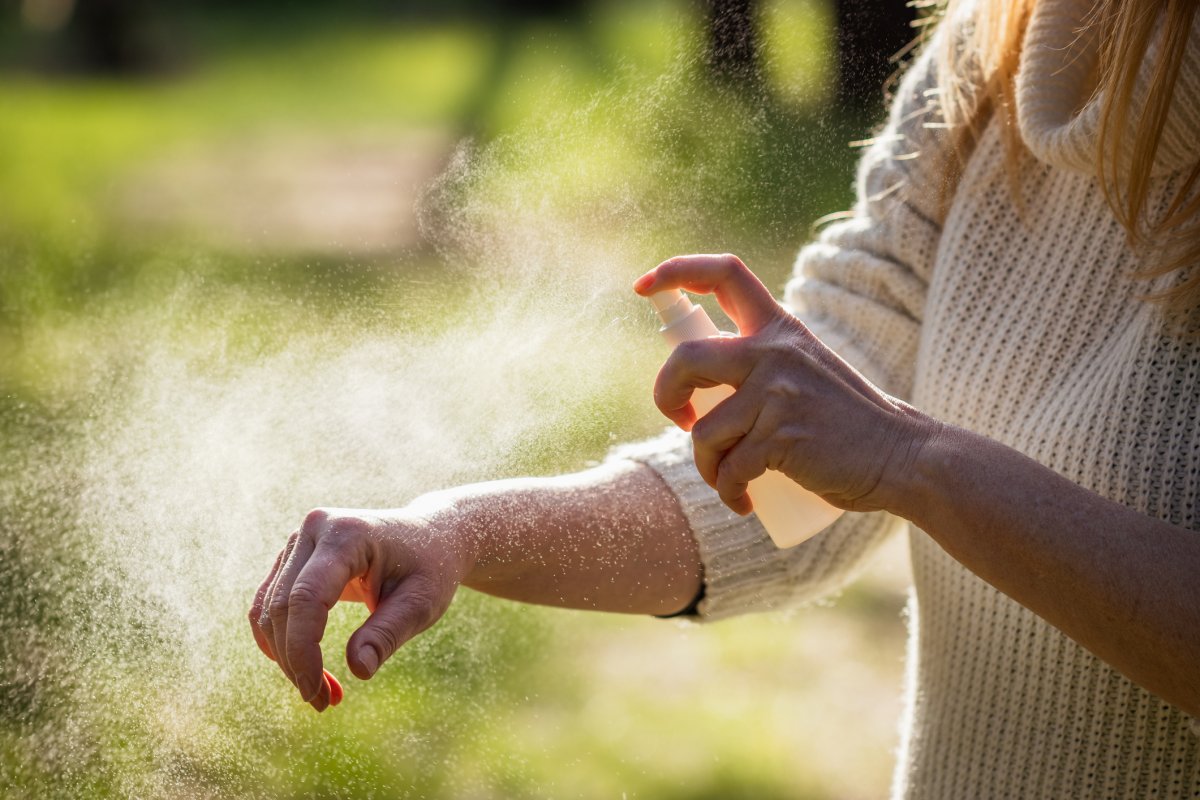Common bug sprays may affect the formation of egg cells during pregnancy, scientists have warned.
DEET, chemically named N,N-diethyl-meta-toluamide, is an active ingredient in many insect repellents. The compound works by interfering with insects' ability to smell humans, essentially making us invisible to them.
"DEET-containing products are available in various forms including liquids, lotions, sprays, and treated materials," Monica Colaiacovo, a professor of genetics at Harvard Medical School, told Newsweek. "It is estimated that an average of 1,800 tons of DEET are used annually in the U.S. and that approximately one-third of the U.S. population uses insect repellent products containing DEET each year."
Eighty-four percent of the U.S. population is estimated to have detectable levels of one of DEET's major breakdown products in their urine.
"DEET can enter our bodies through dermal contact and inhalation when DEET-containing products are applied, for example, onto the skin and clothes," Colaiacovo said. "We can also absorb DEET following the ingestion of contaminated water. The main route of exposure is through dermal contact."
But is this compound safe?
"Case reports of toxicity are rare considering the widespread use of DEET," Colaiacovo said. "The most common side effects after topical exposure are dermatitis or contact urticaria. Either chronic or acute exposures to DEET can result in encephalopathies including tremors, coma, hypertonia, and seizures. Cardiovascular effects such as hypotension and bradycardia have also been observed."
Now, Colaiacovo and her team have found evidence that this chemical might also interfere with our reproductive health. In their study, published in the journal iScience, the team investigated how DEET exposure affected reproduction in the microscopic worm C. elegans.
"Based on our study using the nematode C. elegans as a model system, DEET exposure results in defects during female meiosis—that is the process by which egg cells are formed—and during early embryonic cell divisions," Colaiacovo. "Since female meiosis begins during fetal development in humans, our findings suggest that pregnant women and their fetuses may be more vulnerable to exposure to DEET."
Meiosis is the type of cell division that produces egg and sperm cells, and any errors during this process can result in infertility, miscarriage, stillbirth and genetic conditions such as Down syndrome.
"Using our worm model, we showed for the first time that DEET can have effects on meiosis," Colaiacovo said. "Then we showed why."
The team found that DEET exposure has a significant impact on gene expression—the switching on and off of genes in cells. These changes in expression altered the cells' ability to separate, thus creating egg cells and embryos that were less healthy than those that were not exposed to this chemical.
But how relevant are these results to humans?
"That is always the big question," Colaiacovo said. "Many human genes have equivalents in C. elegans, and worms are a powerful model for looking at effects on reproduction. [However,] while C. elegans is a well-established model for meiosis studies that shares a high degree of gene conservation with humans and is highly predictive of human reprotoxicity, the translation of our findings into humans requires caution and further investigation.
"In our study, worms were exposed to DEET for 24 hours. Although the internal levels of DEET at the end of this treatment were within the range of what is found in most human biological samples, such as blood and urine, humans are usually exposed for much shorter windows of time and therefore future studies will need to assess the effects of DEET on meiosis using a range of shorter windows of exposure."
Whether or not these findings are confirmed in humans, the need to protect people from insect-borne diseases like malaria, Zika and Lyme disease is still paramount to public health. Luckily, DEET is not the only insect repellent on the market.

"There are now various other synthetic and naturally derived repellent compounds, but not as much data regarding their safety," Colaiacovo said. "Some examples are (2-(2-hydroxyethyl)-piperidinecarboxylic acid 1-methyl ester (icaridin), p-methane 3, 8-diol (PMD), and ethyl butylacetylaminopropionate (IR3535)-based repellents.
"Volatile oils and other natural products (citronella, lemongrass oil, cedar oil, geranium oil, and peppermint oil) are less reliable. Products containing citronella oil for topical use are available at concentrations of 5 percent to 15 percent. Protection time with the dermally applied products is considered to be between 30 minutes and 2 hours, although in a recent study the mean protection time was less than 20 minutes with a product that contained a concentration of 10 percent.
"A product containing 2 percent soybean oil was [also] found to protect for about 90 minutes, a period similar to that of a product containing 4.75 percent DEET. However, DEET at a concentration of 6.65 percent and 20 percent protected for a mean of 110 and 230 minutes respectively."
Aside from chemical sprays, other protective measures include covering up your skin and applying repellents to your clothes rather than directly to your body.
"Preventive measures to combat transmission of insect-borne diseases such as Zika, Chikungunya, malaria, Dengue, and West Nile virus are extremely important, and insect repellents are an important line of defense in reducing human risk of exposure," Colaiacovo said. "Our work suggests that the continued development of safe and effective DEET alternatives is of particular importance to pregnant women because female meiosis begins in the developing fetus in the womb.
"The findings in our study underscore the need for future research into the mechanisms of action of DEET on meiosis."
Is there a health issue that's worrying you? Do you have a question about DEET? Let us know via health@newsweek.com. We can ask experts for advice, and your story could be featured on Newsweek.
Uncommon Knowledge
Newsweek is committed to challenging conventional wisdom and finding connections in the search for common ground.
Newsweek is committed to challenging conventional wisdom and finding connections in the search for common ground.
About the writer
Pandora Dewan is a Senior Science Reporter at Newsweek based in London, UK. Her focus is reporting on science, health ... Read more
To read how Newsweek uses AI as a newsroom tool, Click here.






